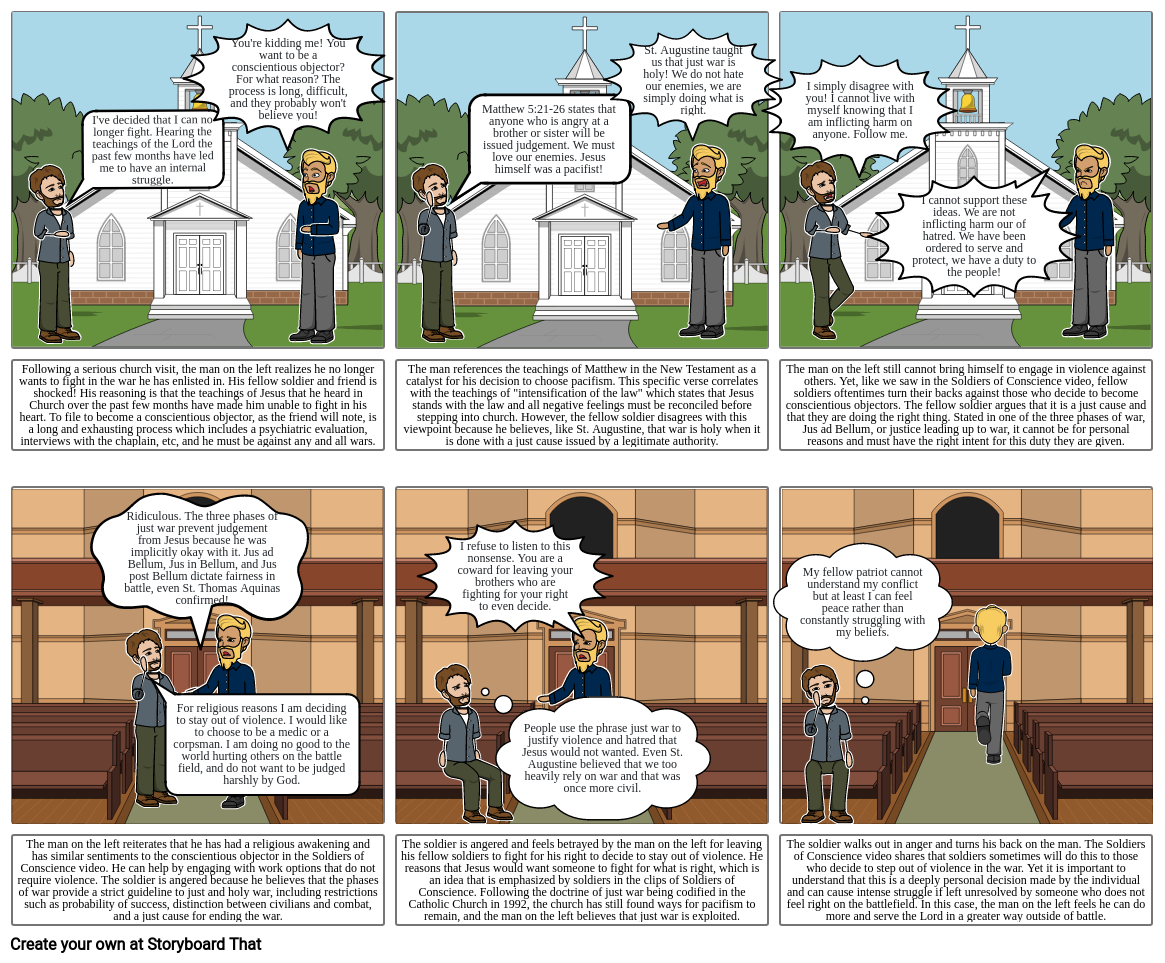Peace, War, & Pacifism

Süžeeskeem Tekst
- I've decided that I can no longer fight. Hearing the teachings of the Lord the past few months have led me to have an internal struggle.
- You're kidding me! You want to be a conscientious objector? For what reason? The process is long, difficult, and they probably won't believe you!
- Matthew 5:21-26 states that anyone who is angry at a brother or sister will be issued judgement. We must love our enemies. Jesus himself was a pacifist!
- St. Augustine taught us that just war is holy! We do not hate our enemies, we are simply doing what is right.
- I simply disagree with you! I cannot live with myself knowing that I am inflicting harm on anyone. Follow me.
- I cannot support these ideas. We are not inflicting harm our of hatred. We have been ordered to serve and protect, we have a duty to the people!
- Following a serious church visit, the man on the left realizes he no longer wants to fight in the war he has enlisted in. His fellow soldier and friend is shocked! His reasoning is that the teachings of Jesus that he heard in Church over the past few months have made him unable to fight in his heart. To file to become a conscientious objector, as the friend will note, is a long and exhausting process which includes a psychiatric evaluation, interviews with the chaplain, etc, and he must be against any and all wars.
- Ridiculous. The three phases of just war prevent judgement from Jesus because he was implicitly okay with it. Jus ad Bellum, Jus in Bellum, and Jus post Bellum dictate fairness in battle, even St. Thomas Aquinas confirmed!
- For religious reasons I am deciding to stay out of violence. I would like to choose to be a medic or a corpsman. I am doing no good to the world hurting others on the battle field, and do not want to be judged harshly by God.
- The man references the teachings of Matthew in the New Testament as a catalyst for his decision to choose pacifism. This specific verse correlates with the teachings of "intensification of the law" which states that Jesus stands with the law and all negative feelings must be reconciled before stepping into church. However, the fellow soldier disagrees with this viewpoint because he believes, like St. Augustine, that war is holy when it is done with a just cause issued by a legitimate authority.
- I refuse to listen to this nonsense. You are a coward for leaving your brothers who are fighting for your right to even decide.
- People use the phrase just war to justify violence and hatred that Jesus would not wanted. Even St. Augustine believed that we too heavily rely on war and that was once more civil.
- My fellow patriot cannot understand my conflict but at least I can feel peace rather than constantly struggling with my beliefs.
- The man on the left still cannot bring himself to engage in violence against others. Yet, like we saw in the Soldiers of Conscience video, fellow soldiers oftentimes turn their backs against those who decide to become conscientious objectors. The fellow soldier argues that it is a just cause and that they are doing the right thing. Stated in one of the three phases of war, Jus ad Bellum, or justice leading up to war, it cannot be for personal reasons and must have the right intent for this duty they are given.
- The man on the left reiterates that he has had a religious awakening and has similar sentiments to the conscientious objector in the Soldiers of Conscience video. He can help by engaging with work options that do not require violence. The soldier is angered because he believes that the phases of war provide a strict guideline to just and holy war, including restrictions such as probability of success, distinction between civilians and combat, and a just cause for ending the war.
- The soldier is angered and feels betrayed by the man on the left for leaving his fellow soldiers to fight for his right to decide to stay out of violence. He reasons that Jesus would want someone to fight for what is right, which is an idea that is emphasized by soldiers in the clips of Soldiers of Conscience. Following the doctrine of just war being codified in the Catholic Church in 1992, the church has still found ways for pacifism to remain, and the man on the left believes that just war is exploited.
- The soldier walks out in anger and turns his back on the man. The Soldiers of Conscience video shares that soldiers sometimes will do this to those who decide to step out of violence in the war. Yet it is important to understand that this is a deeply personal decision made by the individual and can cause intense struggle if left unresolved by someone who does not feel right on the battlefield. In this case, the man on the left feels he can do more and serve the Lord in a greater way outside of battle.
Loodud üle 30 miljoni süžeeskeemi

